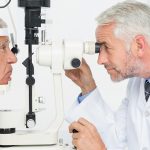Dame Judi Dench’s has put eye health well and truly in the spotlight with her recent revelation that she can no longer read her scripts as she is suffering from Age-Related Macular Degeneration (AMD). But what exactly is AMD, how is it managed and is there anything we can do to prevent it?What is AMD?
“Age-related macular degeneration (AMD) is the leading cause of vision loss for people over the age of 50 in the western world,” says Dr Susan Blakeney, Clinical Advisor to the College of Optometrists. “It’s a condition that attacks the macula of the eye (the part of your retina that is responsible for central vision), robbing the individual of the ability to see fine detail, such as recognising people’s faces, reading or watching television. There are two forms of AMD – wet and dry. The dry form develops gradually and is not treatable so the aim is to try and slow down its progression. The wet form is treatable, therefore early diagnosis and treatment is crucial in order to try and prevent vision loss.”
What are the effects?
“Although AMD rarely causes total sight loss, it robs people of central vision, making it hard or impossible to read, drive, identify faces, watch TV, do fine tasks, navigate stairs and many other everyday tasks,” explains Professor Iain Grierson, Head of Ophthalmology at the University of Liverpool
What are the risk factors?
Age, gender, genes and lifestyle. AMD is most common in the over-60s and women. Your genes and eye colour – blue-eyed people are more at risk – also increase risk, as do smoking, sun exposure, unhealthy eating and possibly alcohol.
How is it diagnosed?
“During an eye test an optometrist measures changes in your vision and examines the back of your eye. If they detect any macular changes you should be given a fast-track referral to the hospital eye clinic,” explains Professor Grierson
How is it treated?
In the past, wet AMD was considered the most serious because of its fast progression, but injectable medications have revolutionised treatment. Dry AMD cannot be treated. Using magnifiers to read and techniques like ‘Eccentric Viewing’, which trains patients with AMD to use remaining peripheral vision, for example by looking slightly to the side of a TV picture, can help.
Can AMD be cured?
No. However, almost everyone affected has enough peripheral vision to continue daily activities.
Can you prevent it?
You can’t change your age, genes or gender, but quitting smoking, wearing sunglasses and a floppy hat to protect your eyes from sunlight, losing weight if necessary and eating a healthy diet may help protect you.
Does nutrition play a role?
“Antioxidants we glean from our diet play a key role in protecting against disease,” says Healthspan’s Head of Nutrition, Robert Hobson. “Those related to eye health include lutein, zeaxanthin, zinc and beta carotene which studies have combined to show their protective effect against age related macular degeneration. Try boosting your eye health by increasing your intake of kale, eggs and avocados, which are rich in lutein, zeaxanthin and zinc. Carrots, mangoes and sweet potatoes will also offer a good source of beta carotene.”
Should I take a supplement?
“There have been two big US trials looking at supplements for AMD and they established that supplements have a part to play,” explains Professor Grierson. “The first showed that an antioxidant vitamin and mineral supplement could delay the progress of AMD in the early stages of the disease. The second showed that lutein has additional benefits for people with low levels of carotenoids in their retina. If you decide to take a supplement look for a formula containing lutein, zeaxanthin, antioxidant vitamins A, C and E, zinc, copper and omega 3 fatty acids for the best results.”
Is there any new research?
“Clinical trials are looking at new treatment options for wet AMD,” explains specialist research charity Fight for Sight. “These may include drops or tablets rather than the current injections and for dry AMD using stem cells to repair the damage.” Fight for Sight (www.fightforsight.org.uk), is the UK’s leading eye research charity, has an investment of about £2.5m in AMD research. This research is focusing on developing a better understanding of the disease as well as better ways of diagnosing those at risk and new treatment therapies.
SYMPTOM WATCH
See the optometrist if…
- You have problems reading small print with your reading glasses
- Your vision isn’t as clear as it used to be
- Straight lines look wavy or distorted





